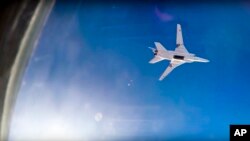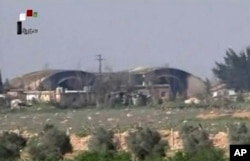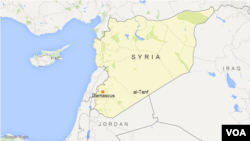The United States military says it is still able to deconflict operations with Russia over Syria, but it is unclear whether the two militaries are still using the two countries' established hotline, aimed at preventing midair collisions of their warplanes in Syrian airspace.
U.S. Central Command spokesman Air Force Col. John Thomas told reporters Monday that the U.S. military had used the line of communication last week to notify the Russians about the impending U.S. strike on a Syrian airfield in retaliation for a chemical weapons attack that killed more than 80 Syrian civilians.
"The regularly scheduled call did go off as normal the next day," Thomas said. "After that, we're not going to talk about the status of the deconfliction line because we're just going to let the situation settle and see what happens."
Moscow asserted on Friday that it had suspended those communications in protest against the April 6 Tomahawk cruise missile strike on al-Shayrat airfield.
The communication line is primarily used to ensure that Russian and U.S. planes conducting combat missions in Syria do not get into unintentional confrontations. The U.S. is using the airspace to conduct strikes against Islamic State terrorists.
Thomas said the U.S. has "continued to deconflict as necessary with the Russians" using "all of the available means," but he declined to comment on whether the U.S.-Russia hotline was still available for use.
'Measured response'
Also Monday, Secretary of Defense Jim Mattis issued a statement on the U.S. strike on al-Shayrat, calling it a "measured response to the Syrian government's use of chemical weapons."
Mattis said President Donald Trump "directed this action to deter future use of chemical weapons and to show the United States will not passively stand by while Assad murders innocent people with chemical weapons, which are prohibited by international law and which were declared destroyed."
The defense secretary noted that the strike on the Syrian airfield resulted in the damage or destruction of fuel and ammunition sites, air defense capabilities, and 20 percent of Syria's operational aircraft.
"The Syrian government has lost the ability to refuel or rearm aircraft at Shayrat airfield and, at this point, use of the runway is of idle military interest," Mattis said in the statement.
While briefing reporters Monday, Central Command spokesman Thomas said the number of U.S. strikes against Islamic State militants in the region has been reduced as U.S. Lt. Gen. Stephen Townsend, the ground commander for coalition forces in Iraq and Syria, repositions forces to assure force protection for his troops.
U.S. officials have expressed concern to VOA that Russian or Syrian military forces might try to respond to the "one-off" U.S. assault by targeting U.S. troops fighting Islamic State inside Syria.
Al-Tanf attack
Meanwhile, U.S. Central Command said American special forces helped repel an Islamic State attack on a military base in southern Syria on Saturday.
About 20 or 30 of the terrorist fighters attacked a gate at the al-Tanf garrison, using a vehicle-borne explosive device and suicide vests.
Thomas told reporters that U.S. military forces were at the base and in other nearby areas.
"There was close air support that was provided. There was ground support that was provided, and there was medivac that was supported by the coalition," Thomas said.
No Americans were killed in the attack, but three members of the Syrian partner force died, according to Thomas.






